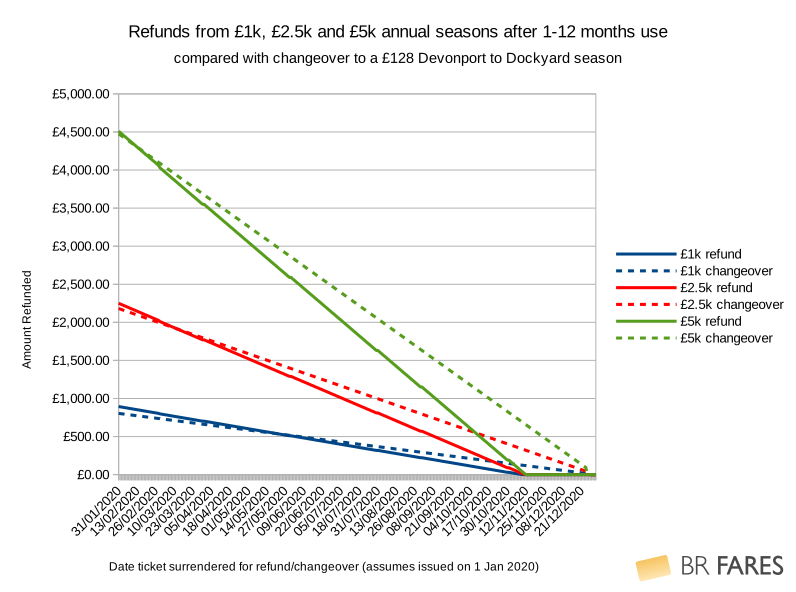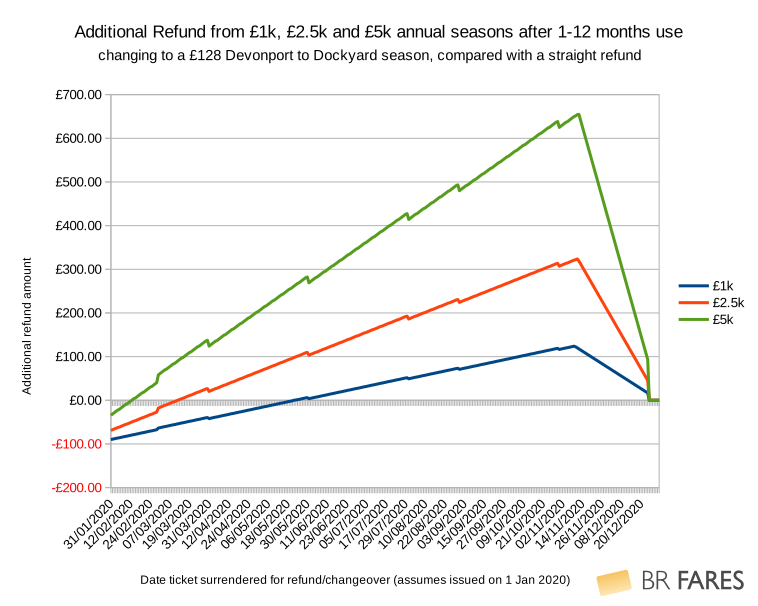pro-rata
calculated according to, or as a share of, the fixed rate for a larger total amount
The coronavirus shutdown means many commuters are considering “cashing in” the value stored in their annual rail season tickets, as they won’t be using them for a while. In these unfortunate circumstances, with many people desperate for a little bit of extra cash flow, the ideal is to get a pro-rata refund, i.e. you are refunded proportionally according to the amount of time left to run on your ticket.
Passengers who had not previously had call to refund a ticket may have assumed their refunds would be calculated pro-rata, encouraged by a government press release:
All season ticket holders can claim a refund for time unused on their tickets.
Department for Transport press release, 23 March
As the normal season ticket refund rules offer no refund at all once an annual season has been used for 10 months and 12 days, some people (typically those who enjoy decoding press releases as a pastime!) assumed that the reference to all season ticket holders meant the newly nationalised railway was bringing in pro-rata refunds.
But no such luck! The old refund rules still apply, and even the £10 administration fee is still there in theory (except in Scotland). Quoting from the National Rail Conditions of Travel (NRCoT):
Any refund to which you are entitled will be calculated from the date the Season Ticket is returned. The amount refunded will be based on the price paid for your Season Ticket less the cost of any Season Ticket(s) and additional Tickets required to cover one return journey for each weekday that your Season Ticket was actually held for, and an administration charge (not to exceed £10).
NRCoT Section 40.3
If you’ve used your season for less than a month this is tricky to calculate and depends on the number of weekdays elapsed and the fares for the individual journey (which can sometimes vary depending on the direction of travel). But for any period between 1 to 12 months of usage it’s fairly simple:
Up to 10 months 12 days used:
Divide the price of your season by 40 to get the base rate, then multiply it by the following factor:3.84 x (no. of whole months) + 0.64 x (no. of 5-day periods) + 0.13 x (no. of remaining days)
and round the result up to the next 10p.
This is what it would have cost to buy a season for the period you’ve used it in the first place. Subtract this from the price you paid, then subtract another £10 for the admin fee, and that’s what you’ll get back.
Between 10 months 13 days and 12 months used:
You get nothing back.
The reason for this disappointing outcome is that the refund rules (as quoted above) stipulate you can only get back what it would have cost you to buy a shorter-period season ticket in the first place. But an annual ticket costs the same price as a ticket valid for 10 months and 13 days: the final 7 weeks or so of the year are thrown in for free, and you don’t get a refund if you stop using your ticket during these final 7 weeks of validity.
The graph below shows what you would get back for an annual season priced at £1,000, £2,500 and £5,000 (solid blue, red and green lines respectively) if you bought it on 1 January and handed it in for a refund at any time between 1 February and 31 December. If you hand it in for a refund on 12 November or later, you get nothing back.

BUT HERE COMES THE TRICK!!!!
The above discussion is all about a refund, for which the rules are defined in Section 40 of the NRCoT. But if we read on to Section 41, the rules are different if you want to change your season ticket to a cheaper one. Then you are indeed entitled to the magical pro-rata refund:
You may change your Season Ticket for another covering a different journey or class of travel provided that the original Season Ticket was valid for one month or more and has at least seven days’ validity remaining. In this case, you will only be required to pay the difference in price between your original Season Ticket and the new one, based on the number of days of validity remaining on your original Season Ticket.
NRCoT Section 41.1
For changeovers, the refund (or extra cost, if you’re changing to a more expensive ticket) is calculated in an entirely different manner. In effect, because the passenger is still going to hold a ticket for the rest of the year, the railway has chosen to be less draconian:
- Instead of considering what it would have cost to buy a shorter-period season, it considers the pro-rata difference “based on the number of days of validity remaining”.
- As an added bonus in favour of the passenger, the pro-rata calculation always assumes 365 days’ validity for an annual season, so there is no additional penalty for doing a changeover in a leap year.
- And as a further added bonus, there is no administration fee for doing a changeover!
To maximise the value you get from a changeover refund, you will probably want to changeover to the cheapest ticket possible. This is currently an annual season from Devonport to Devonport Dockyard (two stations less than half a mile apart serving, as the names suggest, the Devonport naval base in the suburbs of Plymouth). This is the cheapest season ticket in the country and costs £128 for an annual.
The calculation then proceeds as follows, for an example of a £5,000 season ticket purchased on 1 January being handed on 13 November, i.e. after 10 months and 13 days of use:
First we calculate the effective daily rate for each season, by dividing each price by 365 and rounding to the nearest penny.
| Old £5,000 season: | £13.70 |
| New DPT-DOC £128 season: | 35p |
| Number of days remaining (14 November to 31 December): | 48 |
Refund Due: (£13.70 – £0.35) x 48 = £640.80
Considering that the refund value at this stage was zero, a changeover refund of £640.80 is worth having!
The graph above also shows the refund value that can be obtained by changing to a Devonport to Dockyard season, as an additional series of dashed lines.
Finally, the graph below shows the additional refund amount you can gain by doing a changeover to a Devonport to Dockyard season, compared to applying for a straight refund. I believe the odd-looking kinks in the graph are simply due to rounding anomalies in the formulae for calculating the price of an odd-period season ticket, which appear to pre-date the computer era!

There is no requirement to have any connection with Plymouth to change over to this season, so it’s an ideal way to get a bit of extra value out of your season ticket, should you need to cash it in.
Some great ideas there, Paul. There is a much simpler explanation for the notches though. The first one jumps up because of the lack of a 30th day in February, while the downs relate to the extra day in March, May, July, August and October.
Of course! Thanks Mike. I felt sure it was due to some peculiarity of that formula but couldn’t put my finger on what exactly. So yes: the calculation is based on an average month length of 30 days, therefore if you hand your season in for a refund on the 31st of a month you will, in a sense, have got a free day – meaning a changeover done on that day is slightly poorer value, hence the little dips in the graph on each 31st as you point out.
Whereas if you hand in for a refund on the last day of February you will still pay for a full 2 months at the normal price, but miss out on 1-2 days’ validity, therefore there is a jump in the relative value of a changeover that day.
Which gets me thinking – maybe you don’t have to accept a full 2 months being used for the calculation? If you hand in for a refund on the last day of February and ask for the period to be calculated as 1 month and 28/29 days as appropriate, you’d get a better result. Perhaps it depends on the clerk you get on the day?
The one problem with requesting a changeover at the moment is that they can only be done at a Ticket Office due to the requirement to issue a new ticket and TOCs are cutting opening hours – in some cases closing offices altogether – due to the current situation.
There’s also the matter that, even in the normal course of events, not every Ticket Office is able to issue a changeover. Not because the issuing system in use can’t do so, but generally because the clerk hasn’t been trained in how to calculate and issue them.
I’ve also heard that one TOC is now getting their Revenue Protection team to investigate changeover applications due to a massive increase in numbers due to the current situation, even though it’s explicitly permitted in the NRCoT.
Yes, and I’ve just realised I left out the specific section that entitles you to a refund when changing to a cheaper season, so here it is for completeness:
41.2. If your new Season Ticket is for a cheaper journey or class of travel, you
will be entitled to a refund on the original Season Ticket, based on the number of
days of validity remaining on your original Season Ticket at the time that you ask
for your Season Ticket to be changed.
Can you then immediately hand your Devonport to Dockyard season ticket in for a refund which will be less just one daily ticket cost and £10 admin fee so you probably get over £110 back from that £128?
And get a very surprised / annoyed / confused ticket clerk!
That’s a good point. It’s more relevant towards the start of the graph (and of course after 10 months 12 days you’ll get nothing back at all) but yes, it would offset the negative values towards the left hand side. Unfortunately I don’t have time at the minute to do a new graph taking the residual refund value of the DPT-DOC ticket into account but maybe some time I will… it’s such a surprisingly complicated subject!